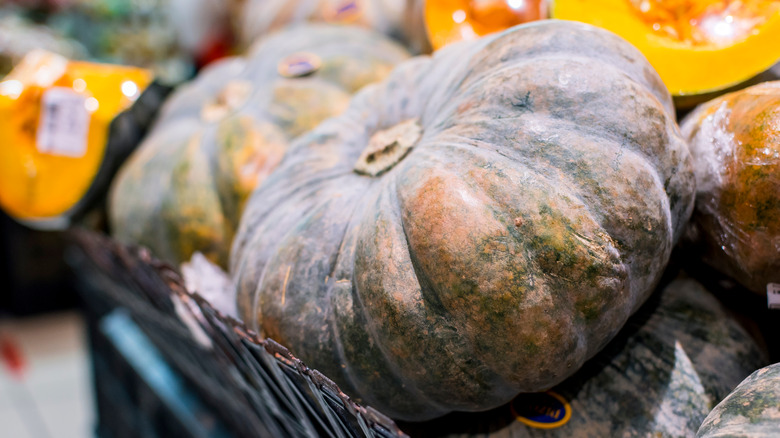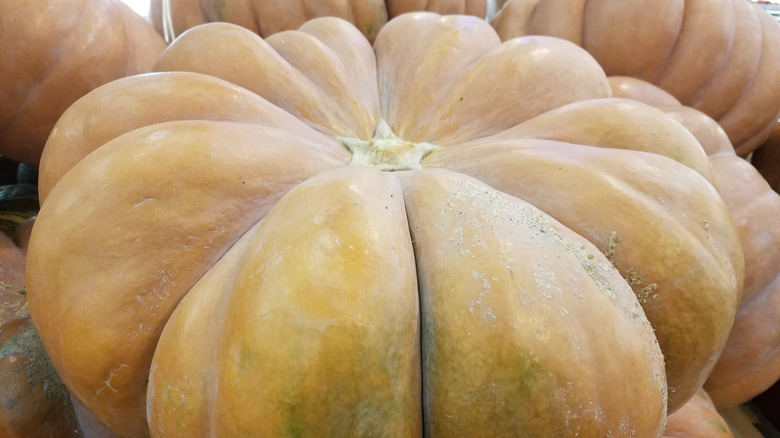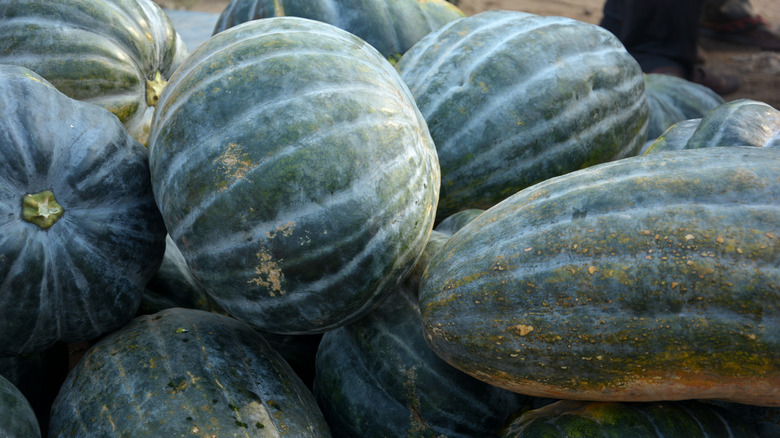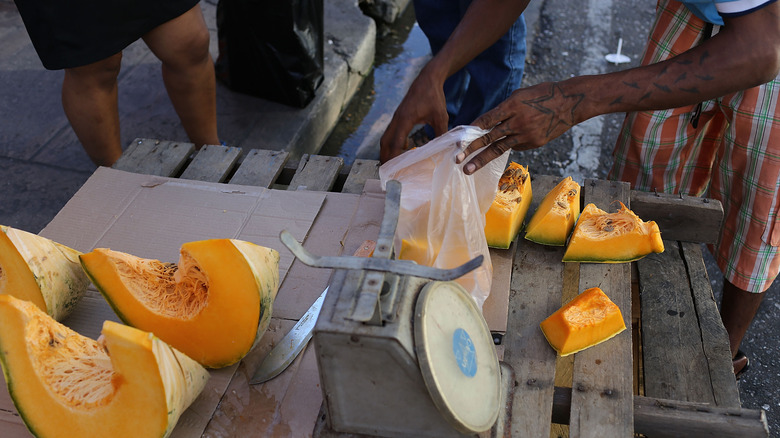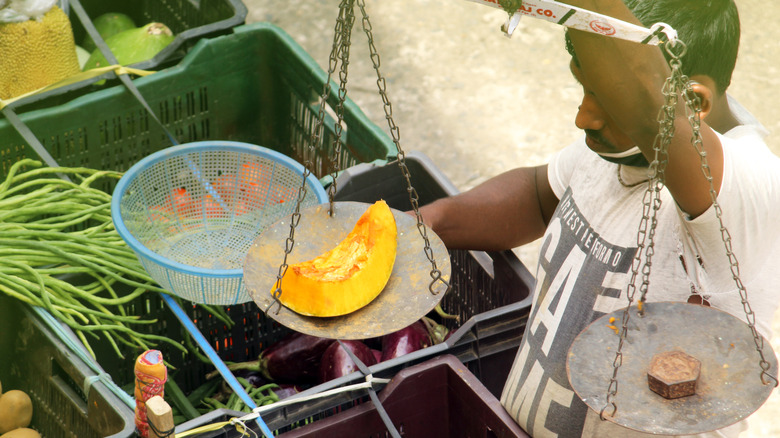What Is Calabaza Squash And What Does It Taste Like?
It feels like there are hundreds of different types of squash out there and differentiating between them can get confusing. According to AllRecipes, farmers have cultivated over 100 types of summer and winter varieties of the plant and each one contains something special. While you can easily find something to love about squash in all of its forms, deciding which kind to indulge in can feel overwhelming.
Popular types of the vegetable, like zucchini, butternut squash, spaghetti squash, or acorn squash offer up healthy options if you want to diversify your diet, but one versatile strain can serve up wonders when you want a new food to enjoy for dinner or lunch. The calabaza squash, or cucurbita moschata, stands apart from the rest thanks to the fact that the vegetable has found an audience across the world and dishes out some unique flavors and textures few other squash can compete with.
What is calabaza squash?
According to AllRecipes, calabaza squash is native to South and Central America, as well as the Caribbean and dates back over 7,500 years (via Specialty Produce). Over time, locals came to know the plant as Cuban squash, zapollo, auyama, abóbora, calabash, calabasa, West Indian pumpkin, and green pumpkin. With so many monikers, it's easy to confuse the vegetable for other squash.
This tropical species features long vines and even belongs to the same family as pumpkins and gourds. The calabaza squash shares a similar shape to a pumpkin, but you can always identify this particular squash thanks to its light tan or green skin. The gourd has firm, yellow-and-orange flesh that surrounds a large, central seed cavity full of flat, hard, cream-colored seeds, much like a traditional pumpkin or butternut squash. The pulp in this cavity also has a stringy texture and should be removed before eating. While you don't want to consume the thread-like pulp, the flavor of the calabaza's flesh can fit almost any recipe.
What does calabaza squash taste like?
You may expect a calabaza squash to have a similar flavor to a pumpkin thanks to the shared resemblance, but the taste of the calabaza actually compares to other winter squash varieties. According to Specialty Produce, cooked calabaza squash has a smooth texture and a mild, nutty flavor, similar to butternut or acorn squash. Thanks to the similarities, you can even use this variety to replace butternut or acorn squash in certain recipes.
Calabaza squash made a name for itself across kitchens everywhere thanks to its creamy texture and mild flavor, making it perfect for sweet and savory dishes alike. It goes great with a wide variety of flavors found in shallots and raisins, all the way to brown sugar and crème fresh (via Specialty Produce). With a taste like this, you won't have any problem finding ways to cook with this unique squash.
How do you cook with calabaza squash?
Similar to other winter squash varieties, calabaza squash easily finds its way into sweet pies, savory stews, soups, and much more (via Specialty Produce). You can even roast the vegetable as a snack. Additionally, the calabaza squash tastes great when steamed, grilled, braised, sauteed, or baked. If you prepare it, just make sure to remove the seeds and the skin before cutting it into wedges or cubes.
When you cook and purée the squash, take advantage of its smooth texture for pies, puddings, bread, and soups. You could also transform calabaza into bread or muffins, and even creamy calabaza pie for dessert. It turns into a great filling in casseroles, enchiladas, tacos, stir-fries, stews, and more. Any recipe that calls for pumpkin, acorn, or butternut squash could also use Calabaza squash, and its mild flavor means it can be added to a variety of dishes without adding an overpowering flavor to a recipe.
Where can you buy calabaza squash?
If you haven't seen calabaza squash in your local grocery stores, you're not alone. This variety of squash primarily grows in Central and South America and doesn't always make it to the United States (per Specialty Produce). While the squash has yet to find a firm foothold throughout the U.S., calabaza has found a growing market in Florida and other parts of the United States adjacent to Central America over the past 30 years.
If you do find the squash in your store, expect calabaza to make an appearance next to the other squashes and gourds. You should have the most luck tracking down the squash at local markets and specialty grocers, such as Whole Foods Market, Lucky's, Natural Grocers, or similar outlets. If you live in an area like Florida or Texas that has more access to popular Latin American foods and produce, you could have an easier time getting your hands on this product.
What season is calabaza squash best in?
Like many squash types, calabaza squash gets harvested year-round, so don't worry about picking up this squash while it's in season. On the other hand, the vegetable is a winter squash. People harvest this variety of vegetable in the summer, but this kind of produce reaches its peak flavor during the fall and winter months (via AllRecipes). Many of their native growing zones rarely dip below freezing. According to Gardening Know How, calabaza squash plants have a long growing season and but can't take too much cold weather and for this reason, the plant needs to primarily grow in tropical climates thanks to the areas' warm temperatures.
If you find calabaza for sale, know that the ingredient reaches its peak in the autumn and tastes best during those months. There are so many delicious ways to cook this squash, so it's worth buying one if you see it.
Nutritional information about Calabaza Squash
According to Specialty Produce, calabazas can grow anywhere between the size of a cantaloupe and a watermelon, making for a sizable vegetable. Like other varieties of winter squash, calabazas have high nutritional values, while being low in calories and carbohydrates. The squash contains vitamins A, B, and C, thiamine, riboflavin, fiber, and beta-carotene, and serves as a solid choice when you want to give your meals a healthy boost.
According to BBC Good Food, an eating plan with tons of fruits and vegetables potentially reduces the risk of osteoporosis, while a 2016 study found that diets loaded with beta-carotene, vitamin C, zinc, and sodium resulted in stronger bone health in postmenopausal women (via The Journal of International Medical Research). Calabaza squash contains all of these nutrients, meaning it may strengthen bone health in certain individuas. Plus, the squash tastes delicious, making it super easy to add to any recipe and any diet.
